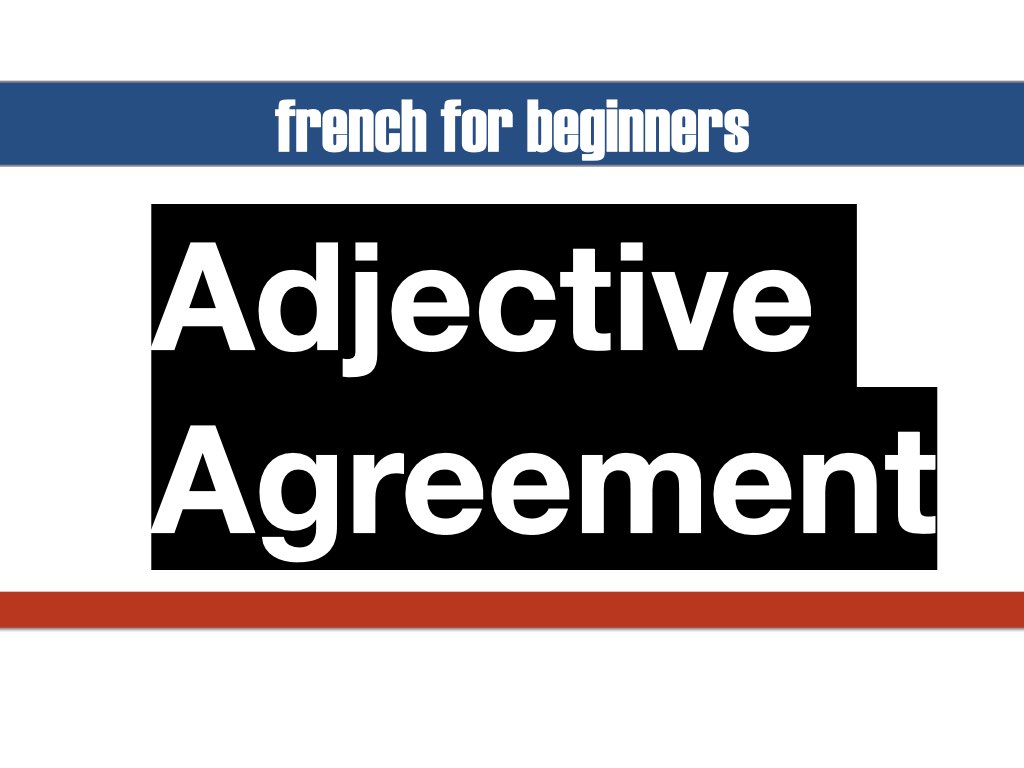French Adjective Agreement – Comprehensive Guide
Introduction
Mastering adjective agreement in French is vital for accurate and nuanced communication. This lesson covers the agreement of adjectives in gender and number, offering structured exercises for reinforcement.
Adjective Agreement Rules
Gender Agreement
- Adjectives agree with the noun they describe in gender (masculine or feminine).
- To form the feminine, usually add -e to the masculine form.
| Masculine Singular | Feminine Singular | English |
|---|---|---|
| grand | grande | big |
| petit | petite | small |
| amusant | amusante | amusing/funny |
| intéressant | intéressante | interesting |
- Examples with Qualitative Adjectives (Adjectifs Qualificatifs):
- La grande maison (The big house)
- Le petit chat (The small cat)
- Examples with Attributive Adjectives (Adjectifs Attributs):
- La maison est grande. (The house is big.)
- Le chat est petit. (The cat is small.)
Certain adjectives necessitate a slight modification in the feminine form:
- Un ami sportif -> Une amie sportive (An athletic friend)
- Un garçon gentil -> Une fille gentille (A kind boy/girl)
Adjective Agreement : Examples of Adjectives with Modifications:
| Adjective (Masculine Singular) | Feminine Singular | English Meaning |
|---|---|---|
| sportif | sportive | athletic |
| actif | active | active |
| bon | bonne | good |
| mignon | mignonne | cute |
| cher | chère | expensive, dear |
| léger | légère | light (weight) |
| italien | italienne | Italian |
| brésilien | brésilienne | Brazilian |
| gros | grosse | big, fat |
| gras | grasse | fatty, greasy |
| long | longue | long |
| gentil | gentille | kind, nice |
| heureux | heureuse | happy |
Number Agreement
- Adjectives agree in number (singular or plural).
- To form the plural, typically add -s to the singular form.
| Masculine Plural | Feminine Plural | English |
|---|---|---|
| grands | grandes | big |
| petits | petites | small |
| amusants | amusantes | amusing/funny |
| intéressants | intéressantes | interesting |
- Examples with Qualitative Adjectives:
- Les grandes maisons (The big houses)
- Les petits chats (The small cats)
- Examples with Attributive Adjectives:
- Les maisons sont grandes. (The houses are big.)
- Les chats sont petits. (The cats are small.)
Exercises
Exercise 1: Feminine Form
Convert the following masculine adjectives to their feminine form.
- gentil
- intéressant
- bon
- jeune
- amusant
Exercise 2: Plural Form
Make the following singular adjectives plural.
Example : Une histoire intéressante. ➡︎ Des histoires intéressantes.
- Un chien agressif.
- Une maison ancienne.
- Un enfant mignon.
- Une histoire longue.
- Le petit oiseau.
Exercise 3: Correct Form in Sentences
Choose the correct adjective form for each sentence.
- Les fleurs (magnifique/ magnifiques).
- Le livre (intéressant/intéressants/intéressante/intéressantes).
- Les chiens (amusant/amusants/amusante/amusantes).
- La voiture (rapide/rapides).
- Les maisons (bleu/bleus/bleue/bleues).
Exercise 4: Translate and Agree
Translate the following English sentences into French, ensuring adjective agreement.
- The cats are funny.
- The house is pretty.
- The interesting books are on the table.
- The chairs are expensive.
- The girl is kind.
Exercise 5: Adjective Modification
Modify the given adjectives to fit the noun they describe in gender and number.
- Les garçons (gentil).
- La femme (sportif).
- Les filles (heureux).
- Le garçon (intéressant).
- Les amis (fidèle).
Adjective Agreement : Conclusion
Through these exercises, you’ve practiced applying the rules of adjective agreement in French across various contexts, enhancing your grammatical accuracy and expressive capability. Continue to practice these principles to further solidify your understanding and usage of French adjectives in conversation and writing.


